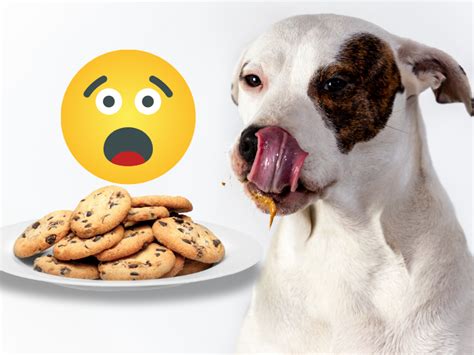The sweet temptation of chocolate chip cookies can be too great for dogs to resist, especially when left unattended on the counter. If your dog has just devoured a chocolate chip cookie, it's essential to take immediate action to ensure their safety.
Understanding the Dangers of Chocolate for Dogs
Chocolate contains a group of compounds called xanthines, specifically theobromine and caffeine, which can be toxic to dogs. The darker the chocolate, the more toxic it is. Chocolate chip cookies, in particular, can be problematic because they often contain a mix of dark and milk chocolate, making it harder to determine the exact amount of theobromine consumed.

Recognizing the Symptoms of Chocolate Toxicity in Dogs
If your dog has ingested a chocolate chip cookie, keep an eye out for the following symptoms, which can appear within 1-2 hours after consumption:
- Increased heart rate and blood pressure
- Restlessness and hyperactivity
- Vomiting
- Diarrhea
- Abdominal pain
- Increased thirst and urination
- In severe cases, seizures, tremors, and even death
What to Do If Your Dog Ate a Chocolate Chip Cookie
If you suspect your dog has eaten a chocolate chip cookie, follow these steps:
- Remain calm: Panicking can lead to poor decision-making, which can worsen the situation.
- Assess the situation: Determine the amount and type of chocolate consumed, as well as the size and weight of your dog.
- Contact your veterinarian or a pet poison hotline: Reach out to your veterinarian or a pet poison hotline, such as the ASPCA's Animal Poison Control Center (APCC) at (888) 426-4435, for guidance on the best course of action.
- Induce vomiting (if advised): If your veterinarian or the pet poison hotline recommends inducing vomiting, they will provide you with instructions on how to do so safely.
- Provide supportive care: In some cases, your veterinarian may recommend supportive care, such as monitoring your dog's vital signs, administering activated charcoal to help absorb the toxin, and providing fluids to prevent dehydration.

Preventing Future Incidents
To avoid future mishaps, take the following precautions:
- Store chocolate chip cookies and other chocolate products in a secure location, out of reach of your dog.
- Keep a close eye on your dog when baking or cooking with chocolate.
- Educate family members and guests about the dangers of chocolate for dogs and the importance of keeping it out of reach.
- Consider using dog-deterrent packaging or storing chocolate products in airtight containers.
Treatment and Recovery
If your dog requires treatment, your veterinarian may administer the following:
- Activated charcoal to help absorb the toxin
- Medication to control vomiting and diarrhea
- Fluids to prevent dehydration
- Monitoring of vital signs to ensure the dog's safety
In most cases, dogs can recover from chocolate toxicity with prompt treatment and supportive care. However, the severity of the symptoms and the outcome depend on the amount and type of chocolate consumed, as well as the size and weight of the dog.

Long-term Effects of Chocolate Toxicity in Dogs
While most dogs can recover from chocolate toxicity, repeated exposure to chocolate can lead to long-term health effects, including:
- Increased risk of heart disease
- Kidney damage
- Liver damage
- Increased risk of seizures and tremors
Conclusion
If your dog has eaten a chocolate chip cookie, it's crucial to act quickly and seek veterinary attention. By understanding the dangers of chocolate for dogs and taking preventative measures, you can help ensure your furry friend's safety and well-being.
Gallery of Dog-Related Topics






FAQ
How much chocolate is toxic to dogs?
+The amount of chocolate toxic to dogs depends on the type and amount of chocolate consumed, as well as the size and weight of the dog. Generally, dark chocolate and baking chocolate are more toxic than milk chocolate.
What should I do if my dog ate a chocolate chip cookie?
+Contact your veterinarian or a pet poison hotline, such as the ASPCA's Animal Poison Control Center (APCC), for guidance on the best course of action. They may recommend inducing vomiting, administering activated charcoal, or providing supportive care.
Can dogs recover from chocolate toxicity?
+Yes, most dogs can recover from chocolate toxicity with prompt treatment and supportive care. However, the severity of the symptoms and the outcome depend on the amount and type of chocolate consumed, as well as the size and weight of the dog.
